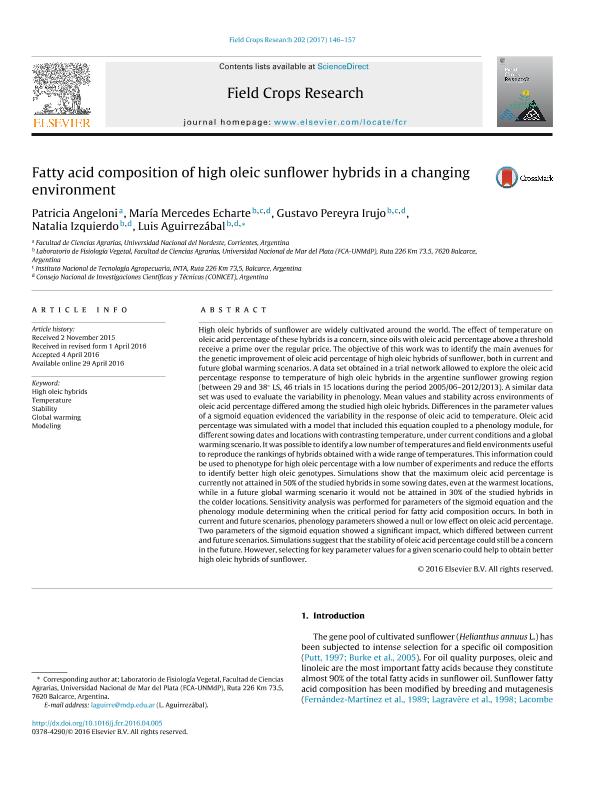Artículo
Fatty acid composition of high oleic sunflower hybrids in a changing environment
Angeloni, Patricia Norma; Echarte, Maria Mercedes ; Pereyra Irujo, Gustavo Adrian
; Pereyra Irujo, Gustavo Adrian ; Izquierdo, Natalia Gabriela
; Izquierdo, Natalia Gabriela ; Aguirrezábal, Luis Adolfo Nazareno
; Aguirrezábal, Luis Adolfo Nazareno
 ; Pereyra Irujo, Gustavo Adrian
; Pereyra Irujo, Gustavo Adrian ; Izquierdo, Natalia Gabriela
; Izquierdo, Natalia Gabriela ; Aguirrezábal, Luis Adolfo Nazareno
; Aguirrezábal, Luis Adolfo Nazareno
Fecha de publicación:
02/2017
Editorial:
Elsevier Science
Revista:
Field Crops Research
ISSN:
0378-4290
Idioma:
Inglés
Tipo de recurso:
Artículo publicado
Clasificación temática:
Resumen
High oleic hybrids of sunflower are widely cultivated around the world. The effect of temperature on oleic acid percentage of these hybrids is a concern, since oils with oleic acid percentage above a threshold receive a prime over the regular price. The objective of this work was to identify the main avenues for the genetic improvement of oleic acid percentage of high oleic hybrids of sunflower, both in current and future global warming scenarios. A data set obtained in a trial network allowed to explore the oleic acid percentage response to temperature of high oleic hybrids in the argentine sunflower growing region (between 29 and 38° LS, 46 trials in 15 locations during the period 2005/06–2012/2013). A similar data set was used to evaluate the variability in phenology. Mean values and stability across environments of oleic acid percentage differed among the studied high oleic hybrids. Differences in the parameter values of a sigmoid equation evidenced the variability in the response of oleic acid to temperature. Oleic acid percentage was simulated with a model that included this equation coupled to a phenology module, for different sowing dates and locations with contrasting temperature, under current conditions and a global warming scenario. It was possible to identify a low number of temperatures and field environments useful to reproduce the rankings of hybrids obtained with a wide range of temperatures. This information could be used to phenotype for high oleic percentage with a low number of experiments and reduce the efforts to identify better high oleic genotypes. Simulations show that the maximum oleic acid percentage is currently not attained in 50% of the studied hybrids in some sowing dates, even at the warmest locations, while in a future global warming scenario it would not be attained in 30% of the studied hybrids in the colder locations. Sensitivity analysis was performed for parameters of the sigmoid equation and the phenology module determining when the critical period for fatty acid composition occurs. In both in current and future scenarios, phenology parameters showed a null or low effect on oleic acid percentage. Two parameters of the sigmoid equation showed a significant impact, which differed between current and future scenarios. Simulations suggest that the stability of oleic acid percentage could still be a concern in the future. However, selecting for key parameter values for a given scenario could help to obtain better high oleic hybrids of sunflower.
Palabras clave:
GLOBAL WARMING
,
HIGH OLEIC HYBRIDS
,
MODELING
,
STABILITY
,
TEMPERATURE
Archivos asociados
Licencia
Identificadores
Colecciones
Articulos(CCT - MAR DEL PLATA)
Articulos de CTRO.CIENTIFICO TECNOL.CONICET - MAR DEL PLATA
Articulos de CTRO.CIENTIFICO TECNOL.CONICET - MAR DEL PLATA
Citación
Angeloni, Patricia Norma; Echarte, Maria Mercedes; Pereyra Irujo, Gustavo Adrian; Izquierdo, Natalia Gabriela; Aguirrezábal, Luis Adolfo Nazareno; Fatty acid composition of high oleic sunflower hybrids in a changing environment; Elsevier Science; Field Crops Research; 202; 2-2017; 146-157
Compartir
Altmétricas



